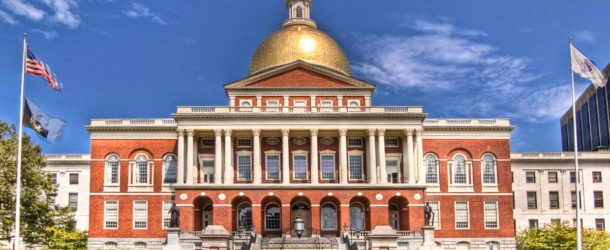Baker-Polito Administration Files $610 Million Economic Development Legislation
Expanded programming and opportunities for communities to pursue job creation, attract private investment and prepare for long-term success
SPRINGFIELD – Today, Governor Charlie Baker released a new economic development framework and legislation, An Act Enhancing Opportunities for All, to build on the administration’s efforts to promote economic vitality in our communities and spur economic growth across the state. This bill serves as the next step forward to bolster Massachusetts’ success, adding on to the achievements and framework unleashed by Governor Baker’s first economic development bill that was passed by the Legislature in July 2016.
“This bill seeks to grow the economy for all regions of the Commonwealth by providing support for small businesses, continuing the successful MassWorks program for Massachusetts’ downtowns and main streets and purchasing more equipment to expand and improve workforce skills training,” said Governor Charlie Baker. “We look forward to working with the Legislature to create a permanent sales tax holiday, to develop a stronger pipeline of trained employees in manufacturing and technology fields and incentivizing business through tax credits.”
This new legislation provides over $610 million in capital authorizations, including $300 million in capital reauthorization for the successful MassWorks infrastructure program, to expand on critical programming created in the administration’s 2016 Economic Development Legislation. Since 2015, the Baker-Polito Administration has awarded more than $430 million in capital to over 130 communities, in public infrastructure, to high schools and community colleges, in the future of advanced manufacturing, and more. In 2017, we had more people working than at any time in state history and our economy has added hundreds of thousands of new jobs since the Baker-Polito Administration took office in 2015.
An Act Enhancing Opportunities for All represents the Baker-Polito Administration’s commitment to continuously evaluate what works and address challenges facing our communities. This legislation is a result of ongoing assessments of our programs created through the 2016 Economic Development Legislation, feedback from stakeholders, and close collaboration with municipal leaders on the needs of communities.
“The bedrock of the Commonwealth’s success lies in our strong communities, and our second economic development proposal calls for a number of initiatives to better partner with cities and towns,” said Lieutenant Governor Polito. “Greater flexibility for communities, housing boards and state agencies will maximize potential economic opportunities, and funding in this legislation will support dredging for our coastal communities and continued support through the Seaport Economic Council for the maritime economy.”
With a focus on communities, businesses and residents, this legislation proposes new initiatives and updates to existing laws that will enhance our ability to grow the economy in every region of the Commonwealth. This includes the creation of a $100 million authorization for a new Regional Development Program, which will enable communities to partner with the state on high-impact projects with the potential to create a significant number of new jobs and greatly benefit the regional economy.
Additionally, the legislation aims to improve existing tools for municipalities through a series of reforms. The administration proposes giving local housing authorities the ability to more efficiently leverage their resources to pursue redevelopment efforts, and provide increased flexibility to address deferred capital needs. Other aspects address challenges municipalities face, including allowing them to accept easements outside their boundaries so they can access broadband networks, and clarify how critical Community Preservation Act funds can be used. Additionally, the legislation authorizes the Department of Conservation and Recreation to lease the state piers in New Bedford and Fall River to MassDevelopment to better unlock the potential of this important coastal infrastructure.
“This initiative is an extension of our partnership with many stakeholders, most notably legislators and municipal officials,” said Housing and Economic Development Secretary Jay Ash. “These leaders have joined our efforts to support broad economic development, from public housing investment and downtown revitalization, to cutting edge research & development that leads to the commercialization of the innovations that result, to building upon our incredibly talented workforce—one of the best in the country.”
Today’s legislation proposes the creation of a new Apprenticeship Tax Credit, to provide more resources for unemployed and underemployed individuals to enter the workforce. It will provide a tax credit of $4,800 or 50% of the wages paid to each qualified apprentice, whichever is less, for employers who hire and train new employees in the high demand areas of the healthcare, manufacturing and information technology fields. This tax credit will build critical apprenticeship pipelines in growing industries across the Commonwealth.
“This legislation will help close skills gaps and ensure that the next generation of workers in the Commonwealth has the training and resources they need to access next generation jobs,” said Labor and Workforce Development Secretary Rosalin Acosta. “By focusing on investing in high demand job categories, employers across Massachusetts will continue to benefit from a pool of highly trained workers to meet their growth needs.”
“The investments in technology and equipment made through the Skills Capital Grants are already having an impact on our students’ future successes in college and careers, and we are very happy to be able to make these additional investments,” Secretary of Education James Peyser said. “The grants enabled schools to support an additional 7,000 students to learn skills in high-demand, growing industries in the Commonwealth.”
“By increasing authorizations for successful programs like MassWorks and Skills Capital Grants, this legislation will ensure we can continue to build on the progress the administration has made to unlock economic potential for our communities and in our workforce,” said Administration and Finance Secretary Michael J. Heffernan. “A permanent sales tax holiday will also foster economic growth for our local businesses in each community across the Commonwealth.”
This legislation proposes making the sales tax holiday permanent in Massachusetts to give more predictability to residents, businesses and our fiscal planners. Businesses throughout the Commonwealth will also benefit from provisions to streamline healthcare reporting requirements and bring insurance law into compliance with new, national models.
Bill Highlights:
Vitality for Communities
- $300 million in capital authorization for the high-impact MassWorks Infrastructure Program.
- $50 million to build on the successes of the Seaport Economic Council in stimulating economic development, creating jobs in the maritime economy sector and protecting coastal assets that are vital to achieving these aims.
- $50 million to partner with coastal communities to address saltwater dredging needs.
- More flexibility for local housing authorities to enter redevelopment partnerships and address deferred capital needs.
Growth for Businesses
- $25 million to build on the tremendous success of our Massachusetts Manufacturing Innovation Initiative (M2I2) and provide matching grants to institutions of higher education across the Commonwealth to collaborate with private industry around emerging manufacturing technologies.
- $12.5 million to provide matching grants for Massachusetts small businesses accepted into the federal Small Business Innovation Research or Small Business Technology Transfer programs.
- $1.25 million to enable community development financial institutions to leverage significant federal funding to support lending for small businesses in need of capital.
- Legislation will allow fantasy sports gaming to continue in Massachusetts, subject to regulations by the Attorney General, past the July 31, 2018 deadline the legislature established in 2016.
- $100 million for a new regional development program to partner with communities on projects with the potential to create large numbers of jobs and make a significant regional impact.
- A permanent sales tax holiday in Massachusetts, to provide predictability for residents and businesses.
Prosperity for People
- $75 million in Skills Capital Grants to fund equipment to expand and improve career technical education programs and programs focused on training and retraining adults in high-demand skills in manufacturing, information technology, and other high-growth sectors.
- A new Apprenticeship Tax Credit for employers who hire and train new employees in high-demand areas of healthcare, manufacturing, and information technology fields.
Successful Provisions from 2016’s Economic Development Bill
The Baker-Polito Administration’s Workforce Skills Cabinet is focused on closing the skills gap in Massachusetts, to ensure we meet the needs of our employers and provide better job opportunities to our residents. Through the Skills Capital Grant program, this administration has already invested more than $38 million to 124 vocational-technical high schools, community colleges and educational institutions to give students and adult learners access to state-of-the-art training equipment. This legislation proposes to continue funding this successful program for our students, with a $75 million authorization that will expand and improve programs training students and adult-learners in high-demand skills in manufacturing, information technology, and other high-growth sectors.
The implementation of the 2016 Economic Development Legislation, An Act Relative to Job Creation and Workforce Development, has resulted in substantial investments throughout the Commonwealth in public infrastructure, site readiness projects, brownfields remediation, new market-rate housing in Gateway Cities, and in the future of advanced manufacturing in Massachusetts.
The Baker-Polito Administration has invested $274 million in MassWorks funding to 134 projects in 106 communities throughout the Commonwealth, spurring the development of over 2 million square feet of commercial and retail space, over 7,000 immediate housing units, at least 7,000 square feet of new public space, and 1,200 new hotel rooms and commercial/retail space.
The Site Readiness Fund has awarded more than $4 million to 26 projects for municipalities and development agencies to finance feasibility studies, master planning, environmental work, strategic land acquisition, and site improvements, with the aim of creating more shovel-ready sites to attract new employers to parcels across the state, and the Brownfields Redevelopment Fund, has already awarded nine communities funding to address contaminated and challenging sites. Through the enhanced Housing Development Incentive Program (HDIP), more than 880 new housing units have been created in Gateway Cities since 2015, with more than 900-units under construction, or in the zoning process.
And, through the Massachusetts Manufacturing Innovation Initiative (M2I2), we have invested nearly $40 million in the future of advanced manufacturing in Massachusetts, matching federal funding to pursue incredible advances in Advanced Fibers and Functional Fabrics, Robotics, Photonics, Flexible-Hybrid Electronics, and biopharma manufacturing. These partnerships will support emerging clusters in Massachusetts by investing in critical R&D infrastructure at research institutions, national labs, and innovative companies, and will expand training opportunities for students and adult-learners to enter these growing sectors.










Comments are closed.